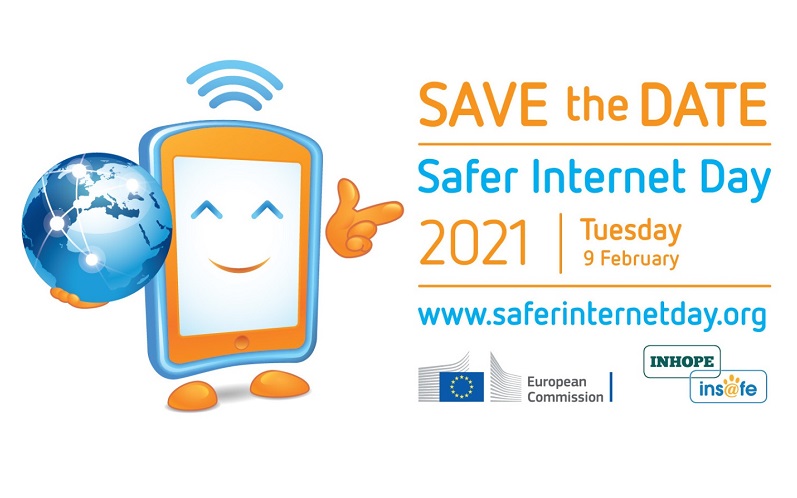
"VAN" (Europe Bureau - Aleksey Vesyoliy) :: On Tuesday, 9 February 2021 we celebrate the 18th edition of Safer Internet Day with actions taking place right across the globe. With a theme once again of "Together for a better internet", this day calls upon all stakeholders to join together to make the internet a safer and better place for all, and especially for children and young people.
Each year Safer Internet Day calls for action from the many players involved in providing a safer and better digital environment for the young users: decision makers at European Union, national and international level, industry, civil society, educators, parents and young people themselves.
Internet is a powerful tool with enormous opportunities for learning, enhancing skills and acquiring new abilities and knowledge, as highlighted especially during the COVID-19 pandemic. However, with opportunities come risks. From cyber bullying to social networking to digital identity each year Safer Internet Day aims to raise awareness of emerging online issues and current concerns. The goal of Safer Internet Day is to raise awareness and to help by concrete actions to provide protection and empowerment of children and young people online.
Digital world knows no borders, and we need everyone to join in and work with others in a way that ensures a better digital experience for all of us, and especially for the younger users.
Starting in 2004 under the first Safer Internet Action Plan as an initiative of the EU funded SafeBorders project and taken up by Insafe, the network of Safer Internet Centres, Safer Internet Day has grown beyond its traditional geographic zone and is now celebrated in more than 170 countries across all continents, and reaches millions of people worldwide.
Children and young people need a safe and stimulating environment while engaging with new technologies and spending time online.
One out of three internet users is a child. They go online at an ever younger age, using a diverse range of devices. They spend more time on the internet and social media, play more online games and use mobile apps, frequently without supervision by adults. New technologies such as artificial intelligence, increased connectivity, augmented and virtual reality will cause an important shift in the way children engage and interact in society.
While the internet offers many opportunities for learning, communication, creativity and entertainment, it also opens up certain risks to vulnerable users such as children.
Online, children can be exposed to harmful content and behaviour such as cyber bullying, sexual harassment, pornography, violence, or self-harm. Efficient responses are needed to prevent negative consequences for their cognitive, social and emotional development.
Children need quality content online, and skills and tools for using the internet safely. Children in Europe are going online on different devices even younger than few years ago. They start using the internet before being able to read or write. Internet use has become more mobile and personalized. At the same time, many young children say there are not enough good things for them to do online. There is no doubt that in today's environment children need the skills and tools for using the Internet safely and responsibly.
In May 2012 the European Commission accepted a European Strategy for a Better Internet for Children to give children the digital skills and tools they need to fully and safely benefit from being online. It also aims to unlock the potential of the market for interactive, creative and educational online content. The strategy proposes a series of actions grouped around the following main goals:
• Stimulate the production of creative and educational online content for children as well as promoting positive online experiences for young children;
• Scaling up awareness and empowerment including teaching of digital literacy and online safety in all European Union schools;
• Create a safe environment for children through age-appropriate privacy settings, wider use of parental controls and age rating and content classification;
• Combat child sexual abuse material online and child sexual exploitation.
The strategy brings together the European Commission and Member States with mobile phone operators, handset manufacturers and providers of social networking services to deliver concrete solutions for a better internet for children.
In a society where technology and the online world are playing an increasingly big role in people’s lives, it becomes evident that education about online safety should provide with all the necessary tools to face the online world in an empowered, inclusive and responsible manner. Generations that are currently receiving their education and those yet to come should get prepared for everyday interaction with information and communication technology. Their knowledge and skills should include critical attitude toward the responsible use of Internet.
Publication author: Sintija Bernava
Chairwoman of the Board, Non Governmental Organisation "Donum Animus"
"Donum Animus" is the only Non Governmental Organisation from Latvia holding Special Consultative Status of the Economic and Social Council of the United Nations
#SaferInternetDay #SID2021
Please find full article with illustrations at EUNetwork.lv
संबंधित खबरें
Responses
Leave your comment